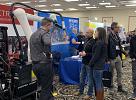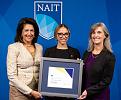- FMA
- The Fabricator
- FABTECH
- Canadian Metalworking
Canadian Job Shops:Getting Better All the Time
Job shop owners have largely good tidings to report, as the economy improves and business outlook becomes sunnier.
- By Canadian Metalworking
- June 20, 2012
- Article
- Metalworking
Job shop owners have largely good tidings to report, as the economy improves and business outlook becomes sunnier.
According to Statistics Canada, overall manufacturing sales in Canada came to $571 billion in 2011, up from $529 billion the year before. While this is still below 2007 sales of nearly $597 billion, it’s a considerable improvement over 2009 when manufacturing revenues slid to $486 billion amidst recessionary pressures.
Monthly indicators weren’t quite as positive, with manufacturing sales slipping 1.3 percent to $49.264 billion in January 2012 then dropping again to $49.121 billion in February 2012. This was still better than February 2011, however, when manufacturing sales were $46.201 billion. Sales picked up again in March 2012, rising to $49.7 billion — the largest increase in nine months.
Some alarm bells have been sounded about proposed changes to the Scientific Research and Experimental Development (SR&ED) tax credit program in the 2012/2013 federal budget. Under proposed changes, the SR&ED investment tax credit rate would be reduced from 20 to 15 percent. Other changes might see capital expenditures removed from eligible expenses. As a result of these moves, manufacturers might scale back on R&D investment, warns the Canadian Manufacturing Coalition, a new group formed to oppose the proposed cut.
For the moment, however, job shop owners are optimistic about the state of the economy, with several reporting they hired new staff this year.
Leslie Payne, executive director of the Cambridge, Ontario-based Canadian Tooling and Machining Association (CTMA) says the recession had a double impact on the job shop sector.
“A lot of shops have gone out of business ... the shops that have weathered the storm are busy at the moment,” notes Payne, who estimates that three-quarters of the 170 member companies in the CTMA’s ranks are job shops.
Payne, who ran his own job shop until 2005, urges job shop owners to scrupulously manage their cash-flow and keep up-to-date on technology.
And, it goes without saying, keep an eye on developments in the manufacturing sector as a whole.
Here’s a look at some job shops across Canada:
NAME: MARTEC PRECISION INC.
LOCALE: BRAMPTON, ONTARIO
FOUNDED: 2006
Martec Precision is owned and run by husband and wife team, Dawson and Marlene Marks.
Among other services, the shop offers precision metal machining and fabricating, prototyping, dot-peen engraving, sandblasting, saw-cutting, deburring and assembly. Industries served include aerospace, moulds and mining.
Dawson and Marlene work closely together, as evidenced by the fact they chose to write joint replies to a list of interview questions.
“We are a job shop but our machines are set up with bar feeders for production work also,” they write.
Dawson likes “the regular challenges” that a job shop presents, note the Marks. In a previous Canadian Metalworking article, Marlene referred to her husband as “the MacGyver of machining” — a reference to the 1980s television character who fought crime with clever, improvised devices and equipment.
“Job shops tend to see the most difficult work that other shops don’t want,” write Dawson and Marlene.
The shop currently boasts four CNC lathes and two CNC mills.
“We have been known for our turning but have added the mills so we can provide complete parts to our customers. Just this year we bought a new CNC mill and are continuously purchasing new machine tools and quality inspection gauges,” state the Marks.
Martec currently employs 12 people who work in two shifts. Since last year at this time, they’ve added two new staff members.
“[Our] biggest challenge over the past year has been dealing with decreasing profit margins. We are all feeling the impact of rising costs for metal, tooling, utilities, fuel, to name a few yet we have been faced with adversity when implementing a shop rate increase,” note the Marks.
The strong Canadian dollar, meanwhile, resulted in a loss of American customers. Still, overall business is good.
“Since opening in 2006, our revenues have increased each year to date. As for 2012, we are confident that we will reach our goal and surpass 2011,” write the Marks.
While hesitant to provide a dollar amount, other statistics underline the shop’s success.
Martec was originally based in cramped 2,300 square foot locale in a Brampton industrial park. As the firm grew, quarters became so tight workers had to turn sideways to get between machines. Martec moved into a larger, 4,600 square foot space in the same industrial park in September 2010 and was up and running in a matter of days.
“We have settled in nicely to our new facility with room for the addition of new machines for future growth. We can also extend our capabilities by adding on an additional shift,” write the Marks.
Martec Youtube video: http://tinyurl.com/75pe7ry
NAME: MECON INDUSTRIES LIMITED
LOCALE: SCARBOROUGH, ONTARIO
FOUNDED: 1962
“We still consider ourselves a job shop, but a more accurate description would be a design and build shop … we design and build industrial equipment. We build coil handling equipment. We build press brake tooling. On both products we have a line of standard designs that we work from but we also do custom,” says Mecon president David Foscarini.
Mecon was founded by Foscarini’s father, Tony, back in the Diefenbaker era. The shop does custom design and build projects for a range of industries, including marine, aerospace and automotive, in Canada and the United States.
At present, Mecon boasts 18 employees — “up a couple from last year’s average,” notes Foscarini, but significantly down from a decade ago.
Back in 2000, the company peaked at 56 employees. This number shrank as the economy became more turbulent.
Mecon has 100+ pieces of equipment — everything from head cranes, machine tools and welders to major hand tools.
“We have a lot of equipment because we used to employ more people. We have six lathes, eight mills, seven boring mills, six grinders, six planers, assorted drills and hand tools, five welders, a shear, a press brake, flame-cutting equipment ... the newest piece is a CNC mill from about 2005,” says Foscarini.
“Our revenues were up last year compared to the year before. We are looking to match or slightly exceed last year for year end, February 2013,” he adds, without providing the actual numbers.
“The strong Canadian dollar has affected our clients more directly than ourselves. They are getting less work so are buying less new equipment or replacing equipment much less often. The strong dollar has also reduced the number of companies in the stamping business. Again, less of our equipment is being sold,” says Foscarini.
“The biggest challenge for us is marketing. Getting our name and abilities out to as many people in as many industries as possible. I suspect the problem is common among shops in the small to medium-size range,” he adds.
NAME: D-M PRECISION PRODUCTS
LOCALE: DUNNVILLE, ONTARIO
FOUNDED: 1952
D-M Precision Products has been run by the Plath family for over half-a-century. The family business patriarch, Reinhold Plath founded the business six decades ago. Reinhold went into partnership with his son, Ben Plath in the late 1970s. Today, D-M is managed by Chad Plath, grandson of the original owner.
Just as the company’s name implies, D-M focuses on precision machining work on all types of exotic materials. D-M makes parts for medical, telecommunications, science research, energy, mobile devices, defence imaging and data collection sectors and boasts 14 employees — two of whom were hired this year, says Chad Plath.
Based in a 10,000 square foot facility, the shop has four Hardinge super precision lathes, three Matsuura milling centers (four axis), six Haas milling centers (four and five axis), one Nakamura-Tome SC-200MY mill/turning center, one Agie Charmille Form 20 die sinking EDM and Agie Charmille Cut 20 wire EDM.
D-M is “currently installing the Nakamura SC-200MY,” adds Plath.
Revenues came to “$1-3 million last year … a little better than 2010. We are looking at surpassing last year’s revenues, but not breaking any records,” he continues.
Plath says he is content to remain a job shop.
“I think the change of day to day activities/jobs creates a learning environment that makes employees interested in what they are doing. [You can go from] machining a cell phone one day to machining devices to help people in the medical industry the next day. It’s a very gratifying industry knowing what you are doing is helping improve the day-to-day lives of people around the world,” he states.
Asked to name the biggest challenge facing Canadian job shops and Plath is quick to reply.
“I hear and have been asked this question numerous times and responses like unskilled labour, overseas competition, lack of government funding are all very common issues. I do believe that over the last 30 years, manufacturing has gotten a ‘dirty’ name and is unattractive to the younger generation,” he says.
NAME: PRECISION COMPONENTS
LOCALE: HAMILTON, ONTARIO
FOUNDED: 1959
“The main service we offer is multi-spindle and Hydromat form tooling as well as custom holder configurations for any of the generic sintered positive or negative inserts commonly used in metal cutting,” says Precision Components vice-president, Shawn Doucette.
The shop also does secondary wire EDM operations in stainless steel and titanium for the medical industry.
“While Precision Components is proud of a strong production platform we are most definitely a job shop and plan to remain that way. Job shops require workers who are multi-talented which allows them to instinctively apply greater attention to detail, providing more value in every job that comes in and out of our shop. It also allows for a little bit of excitement, to keep the entrepreneurial fire stoked by birthing new designs, techniques and processes to make today’s complex high precision parts competitive,” he adds.
Precision has a total of 13 employees — up two from last year at this time — and 25 machines.
“Over the past 10 years we have transitioned about 40 percent of our production to lights out machining and we have the capability to monitor our machines from home when we are extremely busy,” notes Doucette.
He complains that technology has removed the human touch from machining. New workers have difficulty “envisioning the structural changes that occur” in parts during the metalworking process, changes that “can’t be seen or felt inside a CNC machine ... so unless you have a great programmer and a turning center with live tooling, it is getting harder and harder to be competitive,” says Doucette.
http://www.precision-components.ca/
NAME: GAGNON ORNAMENTAL WORKS
LOCALE: GRAND FALLS, NEW BRUNSWICK
FOUNDED: 1968
Gagnon Ornamental Works (GOW) was founded by the father of the current owner, Marco Gagnon, back in the late 1960s.
“We are a job shop. We do have some products for the potato-growing industry that is more standard fabrication … but 90 percent of our business is job shop work,” says Marco Gagnon.
The shop currently has 20 employees and occupies 26,000 square feet of space. In terms of gear, GOW boasts four lathes, four mills, one surface grinder, three saws, three bending machines (one CNC), one shear, two iron workers, one plate roller, two pipe benders, 10+ welding stations and a 16’ x 60’ paint booth.
“We installed a new CNC cutting table and CNC bending machine last year, but we have no capital projects planned for this year,” reports Gagnon.
The shop makes parts using aluminum, carbon steel, stainless steel and other steel alloys and also has a painting department.
“Revenues were up roughly 10 percent in 2011 versus 2010. This year we plan on having comparable numbers to 2011 — no decrease and no major increase,” reports Gagnon.
Asked about the main challenge facing Canadian job shops and he says, “For the smaller shops [getting] financing for projects is a big challenge. We all want to grow, but must find our spot within the supply chain.”
http://www.gow.ca/en/contact.html
NAME: TECHTRONICS MACHINE WORKS LTD.
LOCALE: MUSQUODOBOIT HARBOUR, NOVA SCOTIA
FOUNDED: 1999
When Techtronics first started, owner/founder Ron Marks (a distant cousin of Dawson Marks at Martec) ran the company from the bay of a rented garage. Today, the shop occupies 6,000 square feet in an industrial park.
With 26 full-time employees (up eight from last year at this time, notes Marks proudly), the shop offers three main services: prototyping, production and individual jobs.
“We manufacture precision machined components for aerospace and defence, marine, oil and gas, aquatic and emerging technologies,” says Marks.
The shop is ISO 9001:2008 certified with a total of 25 machines — 12 manual lathes, six manual mills and seven CNC machining centers (three lathes and four mills). Techtronics is a full service machine shop using Computer Aided Manufacturing (CAM) and conventional machines for niche markets.
Techntronic’s last purchase was a hybrid CNC lathe with Y axis and live tooling.
“We plan to make additional purchases this summer of more CNC equipment,” says Marks.
Asked about larger trends within the sector, Marks offers the following: “Job shops are driven by customers and customers are competing in a global market place; Canadian job shops need to ensure quality, competitive pricing and the ability to meet short lead times as well as boosting the value added services you can provide your customers. I think the biggest challenge is staying competitive so that production stays in Canada,” he notes.
About the Author
subscribe now


Keep up to date with the latest news, events, and technology for all things metal from our pair of monthly magazines written specifically for Canadian manufacturers!
Start Your Free Subscription- Industry Events
MME Saskatoon
- May 28, 2024
- Saskatoon, SK Canada
CME's Health & Safety Symposium for Manufacturers
- May 29, 2024
- Mississauga, ON Canada
DiPaolo Machine Tools Open House 2024
- June 4 - 5, 2024
- Mississauga, ON Canada
FABTECH Canada
- June 11 - 13, 2024
- Toronto, ON Canada
Zoller Open House & Technology Days 2024
- June 12 - 13, 2024
- Ann Arbor, MI




















